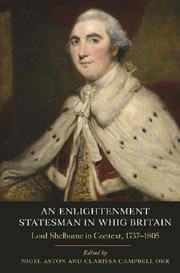Book contents
- Frontmatter
- Contents
- List of Illustrations
- List of Contributors
- Acknowledgements
- List of Abbreviations
- Introduction
- Part One Family, Piety, and Finance
- 1 Petty and Fitzmaurice: Lord Shelburne and his Brother
- 2 Aunts, Wives, Courtiers: The Ladies of Bowood
- 3 A Christian Whig: Lord Shelburne and the Latitudinarian Tradition
- 4 Lord Shelburne, Finance, and Sir Francis Baring
- Part Two Politics
- Part Three The Bowood Circle Revisited
- Index
- STUDIES IN EARLY MODERN CULTURAL, POLITICAL AND SOCIAL HISTORY
3 - A Christian Whig: Lord Shelburne and the Latitudinarian Tradition
from Part One - Family, Piety, and Finance
Published online by Cambridge University Press: 05 September 2013
- Frontmatter
- Contents
- List of Illustrations
- List of Contributors
- Acknowledgements
- List of Abbreviations
- Introduction
- Part One Family, Piety, and Finance
- 1 Petty and Fitzmaurice: Lord Shelburne and his Brother
- 2 Aunts, Wives, Courtiers: The Ladies of Bowood
- 3 A Christian Whig: Lord Shelburne and the Latitudinarian Tradition
- 4 Lord Shelburne, Finance, and Sir Francis Baring
- Part Two Politics
- Part Three The Bowood Circle Revisited
- Index
- STUDIES IN EARLY MODERN CULTURAL, POLITICAL AND SOCIAL HISTORY
Summary
How important was religion to Lord Shelburne? For much of his life, his best-known religious connections were to be found among the leading figures of heterodox Dissent, notably Joseph Priestley, who served as his librarian and literary companion from 1773 to 1780, Richard Price, who became one of his closest confidants, and Thomas Jervis, a tutor to Shelburne's son between 1772 and 1783. All three were Dissenting ministers with highly unorthodox opinions, particularly over the doctrine of the Trinity. Moreover, Shelburne allowed himself to become identified publicly with support for Dissenting causes in Parliament. However, we would also remember that Shelburne was born into, was brought up in, and remained throughout his life a member of, an established Church, in England and in Ireland. For someone well known for imprecision, Shelburne was remarkably explicit in the Lords' debate on the union with Ireland on 19 March 1799 when he declared ‘I am no dissenter, nor am I a Catholic’. But within the Church of England in particular there was a wide range of doctrinal and ecclesiastical opinion and it may be worth asking where within that range Shelburne's own position may be located. It will be the suggestion of this chapter that he had a substantial measure of affinity with the Latitudinarian tradition, a tradition which historians such as John Gascoigne have identified as an important source of intellectual inspiration for the ideas of those whom Derek Jarrett deemed ‘begetters of revolution’.
- Type
- Chapter
- Information
- An Enlightenment Statesman in Whig BritainLord Shelburne in Context, 1737–1805, pp. 79 - 96Publisher: Boydell & BrewerPrint publication year: 2011



